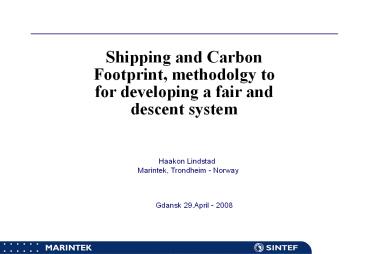Template - PowerPoint PPT Presentation
Title: Template
1
Shipping and Carbon Footprint, methodolgy to for
developing a fair and descent system
Haakon Lindstad Marintek, Trondheim - Norway
Gdansk 29.April - 2008
2
Development of World Energy Consumption 1990 to
2004
3
The New Enviromental picture of Europe
In March 2007 The Europen leaders meet. They
agreed that the energy consumption in 2020 shall
be reduced by 20 compared to 1990. Today
companies are held responsible for the
environmental impact of the activities within
their own part of the value chain. For the
future however, the Commission reveals that
manufacturers will be held responsible for the
green audit of the whole life cycle of the
product, from raw material to consumer good
(from cradle to grave).
4
Key European Transport Figures 2004 (EU 25)
5
The Enviromental Performance area and some of the
relevant KPIs
6
HOW TO MAKE A MODEL OF THE SEA TRANSPORT MARKET
AND THE REAL ENERGY CONSUMPTION
7
(No Transcript)
8
Main Figures per vessel group
9
The Cargo Short Sea Fleet
10
The trend during the last 30 years in shipping is
that nearly all the focus has been on developing
efficient vessels from 30 000 dwt upwards to 300
000 dwt, while the SSS feet has been more or
less neglected. This can be illustrated by the
order books for new building versus the active
fleet
11
Logistics and Distribution scenarios
Dramatic increase in need for attention to
environmental performance required, this could
be the result of a large increase in oil price.
Change phased in from 2014
12
What can be done?
Future vessels Post 2020
New vessels 2010-2020
Saling vessels
13
- SST.2008.2.1.4 Continental Shipping -Sustainable
Shipping - The main idea in this proposal will be to focus
on Improvements for vessels in the range 0 25
000 dwt since these vessels are the ones which is
used in Short sea Shipping. The trend during the
last 30 years in shipping is that nearly all the
focus has been on developing efficient vessels
from 30 000 dwt upwards to 300 000 dwt (the deep
sea fleet), while the SSS fleet has more or less
been neglected. Due to this the following
comparison can be made - Energy efficiency Deep/sea versus short sea
fleet 1 / 10 (carbon footprint 3g/tonnkm
versus 50g/tonn km (best versus worst) - Steel weight Deep sea/versus short sea 1 / 10
(Best in deep sea fleet payload/ steel weight 10
/ 1, Short sea 1 / 2 ) - Short sea versus trucking The trucks have
improved their position both regarding Payload/
own weight and regarding CO2 emissions. So unless
SSS improves trucks will be far ahead a few years
into the future
14
(No Transcript)































